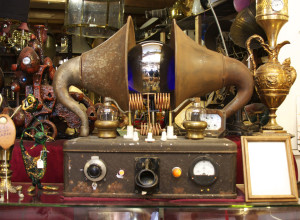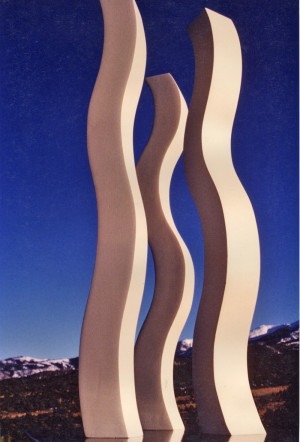By George Sibley
I was glad to see an article recently reporting on a study of mental processes in aging people. It concluded that while older people do think more slowly, it’s not just mental deterioration; it’s at least partially due to the fact that their brains have accumulated a lot more stuff to paw through in responding to anything. This brain load is not “wisdom”; it’s just stuff in boxes and bags all marked “some assembly required.” It can be put together into complex, experience-shaped edifices that will come to be regarded as wisdom if they actually work out as intended. It can also be assembled into complex edifices of monumental and sometimes monstrous folly.
News of this study made me feel better about a situation I recently experienced, in which I backed down without a real fight when challenged on something I’d put on the table at a water meeting (all I seem to do anymore). It involved a kind of slogan – “brand” is probably the term to use today. I had concocted for the water organization holding the meeting, “Balancing our use of the water with our love for the river.” A water lawyer and a couple ranchers questioned what kind of uses I meant, and what I meant by “balancing.” And the lawyer said he did not understand what I was trying to say by “our love for the river.” What does that mean?
I sort of sat there for a few seconds – enough for the silence to get uncomfortable – pawing through the grab bags of my brain from which this slogan had emerged. What did it mean; what did I mean?
Tales from more primal cultures indicate that such silences were not always regarded as uncomfortable: the old people who were the cultural memory for the group were given the time they needed to prowl through those grab bags of the past. Writers sometimes describe such a silence as “pregnant,” which is kind of a powerful thought – a silence that is going to give birth to something, once the “elder” imposing the silence has assembled some new configuration out of the culture’s good and bad experiences.
But we no longer rely on old individuals to carry our cultural heritage and collective experience. We’ve got the global library, increasingly “virtual” and accessible on our smartphones. We can all do an almost instant search and sort on a resource base that dwarfs whatever might be packed in the slow-moving brain of the brainiest of elders, and all silences in a television world are uncomfortable.
I probably shouldn’t have been, but I was kind of flummoxed by the questions. My immediate thought was to wonder what I was even doing there. Unlike the lawyer, I am not a “water professional”; unlike the ranchers, I have no major investment in water. I was there for no reason other than love for the river and the mountains and valleys it has shaped. This love is not just aesthetic. I also really like some of the uses we humans have put the river to because they make sense in the natural context – the fruitful irrigated floodplains, the protected public lands where the nation comes to play, the Gunnison city ditches that turned a sagebrush flat into a riparian city of cottonwoods, aspens and gardens. I will say, though, that I don’t love the lawns. I think Morrow Point Dam, deep in the canyons, is one of the most beautifully designed things that humans have ever integrated with nature’s more random beauty – and the renewable power supply is appreciated for other than aesthetic reasons.
But at the heart of it all is the river, and all that I love about the place where I live goes back to, or comes out of the river in some way. I am also aware, however, that a river can be used to death. In the Upper Colorado River watersheds – Grand and Summit Counties – we’ve seen fairly extreme examples of what happens when large portions of tributaries are removed from a river’s headwaters. The 2012 Colorado River Cooperative Agreement was a masterpiece of negotiation – notable first in that the often-demonized Denver Water Board (deservedly demonized, prior to the 1990s) finally acknowledged a moral obligation to the basin of origin in a major transmountain water diversion. But the beauty of the process should not obscure the fact that most of the benefits to the Upper Colorado tributaries (the Fraser, Williams Fork, Blue and Eagle Rivers, as well as the main stem headwaters) are expensive efforts (paid for by Denver Water) to “downsize” the river and its West Slope water users to fit the amount of water available after the diversions are taken. Essentially, the agreement reduces some Upper Colorado tributaries to permanent drought status. The natural channels are being reduced in size to fit those kinds of flows; and the municipal water and wastewater systems are being upgraded to handle growing demands with less water used more efficiently. People from the Upper Colorado might tell you that the uses of the water are out of balance with their love for the river.
So – anyway. All that is firing around in my old overstuffed brain when I got those questions thrown at me. And it is not an age where the people are prepared to wait twenty minutes or twenty days for an old fart to sort through his fifty years of experience and wonder and concern with his river and all the things it waters. So I just gave up and withdrew my proposed brand for that water organization. “Love” is not a term that real Western men ever use anyway, especially where nature is concerned. I still haven’t learned that.
But then I am faced with the question: where does one go to express and advocate for one’s love for the river and what it has wrought? I am not really an environmentalist, although I am concerned about the environment. I am too aware of my own dependence on the industrial forms of mining, intensive agriculture (another form of mining), logging (often jiggered around to be another form of mining), and recreation-resortism (high-grading the good real estate and recreation sites). I see no future in hating my own life. The challenge is – well, the B word again: to bring my life and its many drains on the environment into balance with the environment that I love. The idea that we can redeem ourselves by outlawing ourselves strikes me as naïve and disconnected.
S
o what do I do with the remainder of my generally consumptive life? Now that I can kind of relax and try to learn how to live intelligently on the planet? Working for water organizations that require a carbon deposit in the atmosphere or two every month, going to meetings where loving the river is probably not part of the articulation, is not a good choice. So I’m still looking and thinking. In my elderly brain-constipated way.
I’ll close with a story that might or might not illustrate anything. Pete Dunda, a retired Air Force pilot who also happens to play a hot accordion for many of our good dances in the Upper Gunnison, invited me to a January “Blessing of the Waters” at the top of Monarch Pass, conducted by several Russian Orthodox churches from the Front Range. Huh?
As it happens (and the aging mind begins to pay more attention to “it happens” as a connector), Pete is of Russian descent and grew up in the Russian Orthodox tradition. “The Blessing of the Waters” is a traditional Russian Orthodox ceremony that weaves together the baptism of Christ with what is probably some pre-Christian pagan ceremony. A mixing of heritages the Russian Orthodox tradition does not deny, according to articles sent to me by Father Anthony Karbo of the Colorado Springs congregation, and principal organizer of this “Blessing of the Waters.”
Anyway, there we were, up on Monarch Pass in typical enough January weather – cold, alternating between weak sun and nasty bluster, cold, snowing a little, and did I mention cold? In the parking lot there, four young Russian Orthodox priests had carved an altar out of the snowpack for their icons, and they led a gathering of maybe 80 people in a celebration of the water that was piling up there for our coming year. A lot of us were kids who participated enthusiastically in the part of the service that involved digging for a cross that was thrown by the priest into the deep snow to bless the future water on each side of the pass.
Huh, I thought. I spend most of my time these days worrying about water we don’t have for the future. Here, we’re just saying thanks for the water we do have. And I hope we can balance our use of that water with our love of the river that runs through us.
But wouldn’t all this have sounded stupid to say, after a ten- or twenty-minute pause to assemble it, in a serious gathering of serious people assembled to seriously discuss our serious water problems?
George Sibley is aging well in Gunnison. Well enough, anyway.


